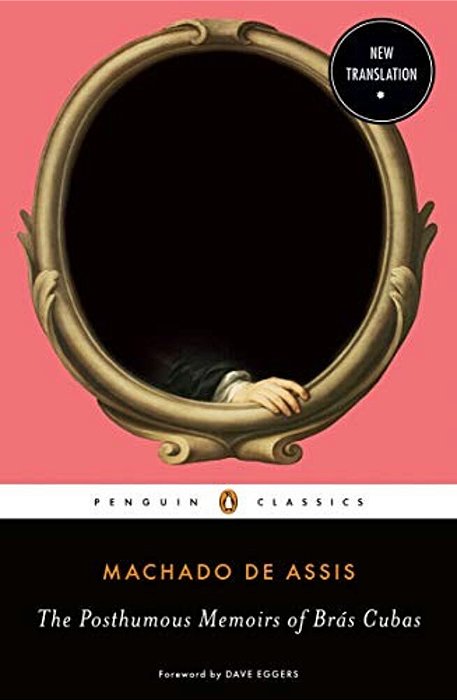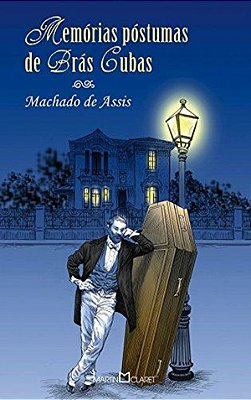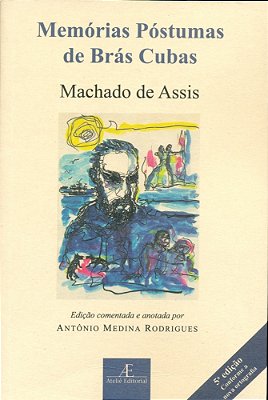The Posthumous Memoirs Of Brás Cubas-..
R$ 157,70
até
3x
de
R$ 52,56
sem juros
ou R$ 149,82
via Pix
Adicionar ao carrinho
Disponibilidade: 45 dias úteis
Estoque: 710 unidades
-
- 1x de R$ 157,70 sem juros
- 2x de R$ 78,85 sem juros
- 3x de R$ 52,56 sem juros
-
R$ 149,82

-
R$ 157,70

"One of the wittiest, most playful, and . . . most alive and ageless books ever written." --Dave Eggers, The New Yorker A revelatory new translation of the playful, incomparable masterpiece of one of the greatest Black authors in the Americas A Penguin Classic The mixed-race grandson of ex-slaves, Machado de Assis is not only Brazil's most celebrated writer but also a writer of world stature, who has been championed by the likes of Philip Roth, Susan Sontag, Allen Ginsberg, John Updike, and Salman Rushdie. In his masterpiece, the 1881 novel The Posthumous Memoirs of Brás Cubas (translated also as Epitaph of a Small Winner), the ghost of a decadent and disagreeable aristocrat decides to write his memoir. He dedicates it to the worms gnawing at his corpse and tells of his failed romances and halfhearted political ambitions, serves up harebrained philosophies, and complains with gusto from the depths of his grave. Wildly imaginative, wickedly witty, and ahead of its time, the novel has been compared to the work of everyone from Cervantes to Sterne to Joyce to Nabokov to Borges to Calvino, and has influenced generations of writers around the world. This new English translation is the first to include extensive notes providing crucial historical and cultural context. Unlike other editions, it also preserves Machado's original chapter breaks--each of the novel's 160 short chapters begins on a new page--and includes excerpts from previous versions of the novel never before published in English. For more than seventy-five years, Penguin has been the leading publisher of classic literature in the English-speaking world. With more than 2,000 titles, Penguin Classics represents a global bookshelf of the best works throughout history and across genres and disciplines. Readers trust the series to provide authoritative texts enhanced by introductions and notes by distinguished scholars and contemporary authors, as well as up-to-date translations by award-winning translators.
Machado De Assis, Joaquim Maria
Machado de Assis (Joaquim Maria M. de A.), jornalista, contista, cronista, romancista, poeta e teatrólogo, nasceu no Rio de Janeiro, RJ, em 21 de junho de 1839, e faleceu também no Rio de Janeiro, em 29 de setembro de 1908. É o fundador da Cadeira nº 23 da Academia Brasileira de Letras. Velho amigo e admirador de José de Alencar, que morrera cerca de vinte anos antes da fundação da ABL, era natural que Machado escolhesse o nome do autor de O Guarani para seu patrono. Ocupou por mais de dez anos a presidência da Academia, que passou a ser chamada também de Casa de Machado de Assis.A obra de Machado de Assis abrange, praticamente, todos os gêneros literários. Na poesia, inicia com o romantismo de Crisálidas (1864) e Falenas (1870), passando pelo Indianismo em Americanas (1875), e o parnasianismo em Ocidentais (1901). Paralelamente, apareciam as coletâneas de Contos fluminenses (1870) e Histórias da meia-noite (1873); os romances Ressurreição (1872), A mão e a luva (1874), Helena (1876) e Iaiá Garcia (1878), considerados como pertencentes ao seu período romântico. A partir daí, Machado de Assis entrou na grande fase das obras-primas, que fogem a qualquer denominação de escola literária e que o tornaram o escritor maior das letras brasileiras e um dos maiores autores da literatura de língua portuguesa. |
| ISBN | 9780143135036 |
| Autor(a) | Machado De Assis, Joaquim Maria |
| Editora | Penguin Classics |
| Ano de edição | 2020 |
| Acabamento | Brochura |
| Dimensões | 19,30 X 13,00 |
Produtos relacionados
Categorias
- A1
- Activity Books
- Atividades Sociais e Profissionais
- B2
- C1
- Catálogos
- Ensino de Idiomas
- Exames Internacionais
- Goethe-Institut
- Literatura Internacional
- Myre - Catálogo De Inglês
- Papelaria e Boutique
- Quinzena Do Consumidor 2025
- Readers
- Educação
- Infantil & Juvenil
- Literatura
- Artes
- Ciências Biológicas
- Ciências Biomédicas
- Ciências Exatas e Tecnologia
- Ciências Humanas e Sociais
- Dicionários e Produtos de Referência
- Interesse Geral












